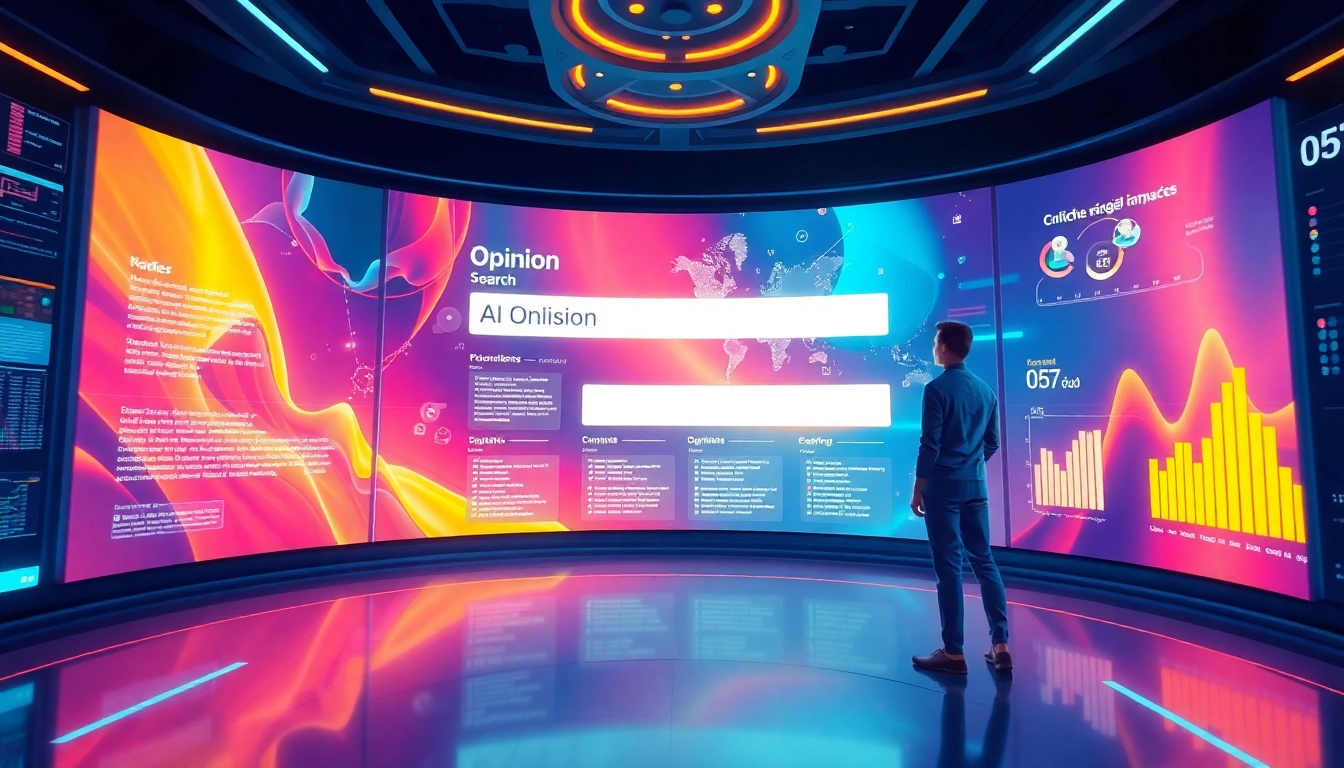
Understanding AI Opinion Search
In recent years, the emergence of AI-driven tools has revolutionized the way we search for information and access research. One notable innovation is the AI Opinion search, a specialized mechanism that synthesizes vast amounts of data to provide users with tailored insights and analyses. This article explores the definition, underlying technology, significance, and distinctions of AI Opinion search in the context of modern information retrieval.
What is AI Opinion Search?
AI Opinion search integrates artificial intelligence with search engine functionality to filter and analyze opinions expressed in various forms of content. Unlike traditional search engines that primarily retrieve documents based on keyword matches, AI Opinion search focuses on extracting sentiment and context from these documents, enabling users to access nuanced viewpoints on specific topics.
This type of search can aggregate opinions from academic papers, news articles, forums, and blogs, making it an invaluable resource for scholars, businesses, and individuals seeking diverse perspectives on relevant issues.
The Technology Behind AI Opinion Search
The effectiveness of AI Opinion search lies in its sophisticated algorithms and machine learning capabilities. Natural Language Processing (NLP) is a core component, enabling AI systems to understand and interpret human language in context. Combined with sentiment analysis, AI Opinion search can identify and categorize emotional tones behind opinions—whether they are positive, negative, or neutral.
Moreover, AI models utilize deep learning frameworks that continuously improve by learning from user interactions and data patterns. This adaptability allows AI Opinion search tools to become increasingly accurate and insightful over time.
Importance of AI Opinion Search in Research
AI Opinion search holds significant relevance in various research fields. By consolidating opinions from multiple sources, researchers can gain a holistic view of a topic. This fosters a well-rounded understanding that pure data analytics might miss. For instance, in academic circles, synthesizing opinions from peer-reviewed papers alongside public sentiment can provide a more comprehensive perspective on controversial topics.
Furthermore, these tools enhance research efficiency, limiting the time spent wading through vast amounts of text. Researchers can focus on relevant insights that directly inform their work, which can be pivotal in time-sensitive industries like healthcare and technology.
How AI Opinion Search Works
Algorithm and Data Processing
The functioning of AI Opinion search systems begins with data collection. These platforms gather information from diverse online sources, including academic journals, social media posts, blogs, news articles, and forums. Subsequently, the gathered data undergoes processing through various algorithms designed to filter, categorize, and analyze sentiment.
Central to this process is the use of AI learning models. These models identify patterns, user preferences, and relevancy based on past queries and interactions. For instance, reinforcement learning algorithms iterate through feedback to enhance the precision of opinion categorization, leading to better user experiences in future searches.
User Interaction and Experience
The user experience plays a crucial role in the effectiveness of AI Opinion search tools. Users typically engage with these systems through natural language queries, which the AI interprets to understand the intent behind the search. Initial search results may display summarized opinions along with core documents, allowing users to quickly assess various viewpoints.
Many platforms also integrate interactive features, enabling users to refine their searches using filters that prioritize specific types of opinions, sources, or sentiments. This user-driven adaptability ensures that search results align closely with individual needs, boosting the overall utility of AI Opinion search.
Comparative Analysis with Traditional Search Engines
While traditional search engines excel in retrieving documents based on keyword relevance, AI Opinion search takes a nuanced approach by emphasizing the interpretation of content within context. For example, a traditional search engine may return articles containing specific keywords but may not account for differing sentiments expressed within those articles.
In contrast, AI Opinion search can discern whether opinions are favorable or antagonistic, offering a layered understanding of public sentiment. This makes it particularly valuable for decision-making processes in areas like marketing, policy formulation, and academic research, where understanding varying perspectives is crucial.
Applications of AI Opinion Search
Academic Research and Scholars
AI Opinion search technology has profound implications for academic research. Scholars can leverage these tools to identify prevailing opinions in their fields, enhancing literature reviews with systematic sentiment analyses. For instance, an academic conducting research on climate change might employ AI Opinion search to scrutinize public opinion across multiple platforms, enriching their understanding of social attitudes alongside empirical data.
Additionally, the ability to aggregate differing viewpoints aids researchers in citing diverse opinions, allowing for a more robust discussion of their findings. As a result, AI Opinion search contributes significantly to comprehensive scholarly discourse.
Business Insights and Decision Making
In the business sector, understanding customer sentiment is vital for strategic decision-making. AI Opinion search can support marketers in analyzing public perception of brands, products, or services, offering insights that drive targeted campaigns and product developments. For example, a company launching a new product can use AI Opinion search to study customer feedback across social media platforms and adapt their strategies accordingly.
Additionally, these tools can aid in crisis management by assessing the effectiveness of communication strategies during public relations challenges, enabling companies to gauge and respond to public sentiment promptly.
Healthcare Innovations and Research
The healthcare industry benefits significantly from AI Opinion search through enhanced patient feedback analysis. By systematically examining patient opinions on treatments, medications, and healthcare services, providers can optimize service delivery and tailor patient experiences.
Moreover, academic researchers can use AI Opinion search to explore public perceptions of emerging health topics, such as vaccination policies or emerging diseases, guiding both policy recommendations and public health campaigns accordingly.
Best Practices for Utilizing AI Opinion Search
Optimizing Search Queries
To maximize the effectiveness of AI Opinion search tools, users should learn to craft optimized search queries. This includes using specific keywords, incorporating synonyms, and framing questions that provoke nuanced responses. For example, rather than searching for “climate change opinions,” a more refined query might be “diverse opinions on renewable energy in climate change discourse.”
Additionally, utilizing advanced search features such as filters for sentiment type or publication date can further refine results, providing the most relevant insights quickly.
Interpreting Results Effectively
Interpreting results from AI Opinion searches requires an analytical approach. Users should look beyond the surface-level summaries of opinions to understand the context, tone, and potential biases within the source material. Evaluating the credibility of sources is essential to ensure that the insights drawn are reliable and valid.
Furthermore, considering a range of perspectives enhances critical thinking, ensuring that users do not develop a one-dimensional understanding of the subject matter.
Integrating Search Insights into Workflow
To truly harness the power of AI Opinion search, integrating the insights gained into existing workflows is vital. For researchers, this could involve incorporating multiple opinions into their findings to enrich their arguments. Businesses can also embed sentiment analysis from AI Opinion searches into their strategic planning processes, ensuring that decisions are informed by articulate public feedback.
Setting up regular alerts or notifications for relevant queries helps maintain current insights, allowing users to stay ahead in a rapidly evolving information landscape.
The Future of AI Opinion Search
Emerging Trends in AI Technology
The landscape of AI Opinion search is continuously evolving. Advancements in NLP and machine learning are likely to enhance the accuracy and contextual understanding of these systems. Emerging technologies such as transformer models and advancements in contextual embeddings are expected to allow AI Opinion search tools to interpret sentiments with more sophistication.
Moreover, integration with multimodal datasets—analyzing text alongside images and videos—will provide a richer tapestry of public sentiment, enhancing the depth of insights available.
Potential Challenges and Solutions
Despite the advantages, AI Opinion search faces several challenges, including potential bias in AI training data and issues surrounding data privacy. To mitigate these risks, developers should continue refining algorithms to prioritize ethical AI practices, ensuring transparency and accountability in how data is used.
Training AI models on diverse datasets can help counteract bias, while implementing robust privacy policies will ensure user data is treated with sensitivity and care.
Vision for AI Opinion Search in Various Industries
The vision for AI Opinion search spans multiple industries, integrating with various data systems to provide comprehensive insights. In education, these tools could assist in curriculum development by evaluating student sentiment on topics and teaching methods. In the legal field, AI Opinion search could analyze public opinion on landmark cases, influencing lawyers’ approaches to litigation.
Ultimately, as AI Opinion search technology continues to develop, we can expect it to play a crucial role in shaping understanding and discourse across diverse sectors.







